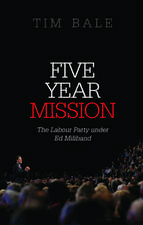Renewing Italian Socialism: Nenni to Craxi
Autor Spencer M. Di Scalaen Limba Engleză Hardback – 13 oct 1988
Preț: 477.80 lei
Preț vechi: 657.18 lei
-27% Nou
Puncte Express: 717
Preț estimativ în valută:
91.43€ • 97.77$ • 76.23£
91.43€ • 97.77$ • 76.23£
Carte tipărită la comandă
Livrare economică 07-12 aprilie
Preluare comenzi: 021 569.72.76
Specificații
ISBN-13: 9780195052350
ISBN-10: 0195052358
Pagini: 360
Dimensiuni: 165 x 243 x 31 mm
Greutate: 0.72 kg
Editura: OUP OXFORD
Colecția OUP Oxford
Locul publicării:Oxford, United States
ISBN-10: 0195052358
Pagini: 360
Dimensiuni: 165 x 243 x 31 mm
Greutate: 0.72 kg
Editura: OUP OXFORD
Colecția OUP Oxford
Locul publicării:Oxford, United States
Recenzii
'For those who like blow-by-blow hagiography, this will appeal. Others may find it useful for the mass of inside information Mr Di Scala has had access to.'Paul Furlong, University of Hull, Political Studies
`Spencer Di Scala, the author of a fine study of Filippo Turati, Dilemmas of Italian Socialism, has now written an equally good history of the post-1945 Italian Socialist party (PSI) ... The result is a provocative, well-researched history of the PSI, based on a combination of archival work, interviews with major protagonists, and a comprehensive survey of socialist periodicals and secondary sources ... it is a tribute to the author's scholarship and objectivity that, despite his ultimately favourable judgement of Craxi, the reader has ample material from which to draw quite different conclusions about the new PSI.'Journal of European Economic History
`Spencer Di Scala, the author of a fine study of Filippo Turati, Dilemmas of Italian Socialism, has now written an equally good history of the post-1945 Italian Socialist party (PSI) ... The result is a provocative, well-researched history of the PSI, based on a combination of archival work, interviews with major protagonists, and a comprehensive survey of socialist periodicals and secondary sources ... it is a tribute to the author's scholarship and objectivity that, despite his ultimately favourable judgement of Craxi, the reader has ample material from which to draw quite different conclusions about the new PSI.'Journal of European Economic History












